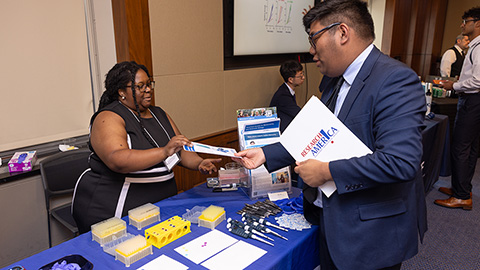ASBMB seeks feedback on NIH postdoc training questions
Should NIH postdoc support be capped at five years?
Should postdocs be required to apply for the K99/R00 mechanism in their first two years?
Should 10% of postdocs' time be spent on training and professional development?
If you have opinions about these questions, the American Society for Biochemistry and Molecular Biology wants to hear from you.
The ASBMB is seeking feedback on a request for information on postdoctoral training and career progression released in late July by the National Institutes of Health. The society’s survey will close Sept. 30.
This RFI and these questions follow a December 2023 report by the NIH advisory committee to the director’s working group on re-envisioning NIH-supported postdoctoral training. According to Jeffrey Brodsky, a member of the ASBMB Public Affairs Advisory Committee, or PAAC, it is an unprecedented document.
“The training environments in which most postdocs currently work are sorely out of date and fail to take into account the job market and the skills that postdocs need to succeed,” Brodsky said. “The RFI, for the first time, addresses both these issues as well as other issues that are required to ensure that our very best newly minted Ph.D.'s pursue postdoctoral training."
After receiving feedback from the public, the working group initially developed six recommendations:
- Increase pay and benefits for all NIH-supported postdoctoral scholars.
- Create and expand mechanisms to support the full talent pool of postdoctoral scholars.
- Facilitate the transition of postdoctoral scholars into the next career stage, including roles beyond academic faculty.
- Promote training and professional development of postdoctoral scholars and their mentors.
- Support safe and diverse perspectives and research environments within institutional research programs
- Improve means to measure and share postdoctoral scholars’ career progression.
To build on these efforts, the NIH wants additional feedback from the scientific community on implementing the three more specific recommendations.
Limit NIH support to five years
The NIH acknowledges that long postdoctoral appointments can be damaging to postdocs’ career progression. The working group suggested capping NIH support to five years to better transition postdocs into both academic and non-academic careers.
Revise the K99/R00 mechanism
The NIH Pathway to Independence award was established to ease postdocs into academic careers by providing mentorship, funding and professional development support. This mechanism allows postdocs to apply within the first four years of their postdoctoral experience. The working group recommended that eligibility be limited to the first two years of a postdoc.
Promote training and professional development for postdocs and their mentors
The agency received many comments from the scientific community on providing career and professional development opportunities. The working group recommended that these opportunities make up at least 10% of the postdoctoral experience, that there be policies and procedures to ensure equity to access of the opportunities and that they include mentorship training for postdocs and their mentors.
In the last RFI, the ASBMB responded, recommending that the NIH expand successful programs such as the K99/R00 funding mechanism and provide digital infrastructure to support postdoc professional development.
Ann West, chair of the PAAC, urged members of the ASBMB to talke a few minutes to fill out the survey for the latest RFI.
“Postdocs are a vital part of our research programs, " West said. "It’s important that we hear from ASBMB members as the NIH and other agencies are re-envisioning the postdoc experience, compensation and benefits, and how we train and support postdocs. Your input will be highly valued as the public affairs team puts together our collective response to this RFI.”
Share your thoughts by the completing the survey.
Enjoy reading ASBMB Today?
Become a member to receive the print edition four times a year and the digital edition monthly.
Learn moreFeatured jobs
from the ASBMB career center
Get the latest from ASBMB Today
Enter your email address, and we’ll send you a weekly email with recent articles, interviews and more.
Latest in Policy
Policy highlights or most popular articles

Embrace your neurodivergence and flourish in college
This guide offers practical advice on setting yourself up for success — learn how to leverage campus resources, work with professors and embrace your strengths.

ASBMB honors Lawrence Tabak with public service award
He will deliver prerecorded remarks at the 2025 ASBMB Annual Meeting in Chicago.

Summer internships in an unpredictable funding environment
With the National Institutes of Health and other institutions canceling summer programs, many students are left scrambling for alternatives. If your program has been canceled or delayed, consider applying for other opportunities or taking a course.

Black excellence in biotech: Shaping the future of an industry
This Black History Month, we highlight the impact of DEI initiatives, trailblazing scientists and industry leaders working to create a more inclusive and scientific community. Discover how you can be part of the movement.

ASBMB releases statement on sustaining U.S. scientific leadership
The society encourages the executive and legislative branches of the U.S. government to continue their support of the nation’s leadership in science.

ASBMB and advocacy: What we accomplished in 2024
PAAC members met with policymakers to advocate for basic scientific research, connected some fellow members with funding opportunities and trained others to advocate for science.

